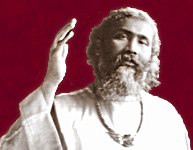If anybody asks you, 'What is Sufism?' What
religion is it?' you may answer, 'Sufism is the religion
of the heart, the religion in which one thing is most
important, and that is, to seek God, in the heart of
mankind.'
There are three ways of seeking God in
the human heart. The first way is to recognize the
divine in every person and to be careful of every person
with whom we come in contact, in our thought, speech and
action. Human personality is very delicate. The more
living the heart the more sensitive it is; but that
which causes sensitiveness is the love-element in the
heart, and love is God. The person whose heart is not
sensitive is without feeling, his heart is not living,
it is dead; in that case the divine spirit is buried in
his heart. A person who is always concerned with his own
feelings is so absorbed in himself that he has no time
to think of another. His whole attention is taken up
with his own feelings, he pities himself, he worries
about his own pain and is never open to sympathize with
others. He who takes notice of the feeling of another
person with whom he comes in contact practices the first
essential moral of Sufism.
The next way of practicing this religion is to think
of the feeling of the person who is not at the moment
before us. One feels for a person who is present, but
one often neglects to feel for one who is out of sight.
One speaks well of someone to his face, but if one
speaks well of someone when he is absent, that is
greater. One sympathizes with the trouble of someone who
is before one at the moment, but it is greater to
sympathize with one who is far away.
And the third way of realizing the Sufi principle is
to recognize in one's own feeling the feeling of God; to
realize every impulse that rises in one's heart as a
direction from God; realizing that love is a divine
spark in one's heart, to blow that spark until a flame
may rise to illuminate the path of one's life.
The symbol of the Sufi Order, which is a heart with
wings, is symbolical of its ideal. The heart is both
earthly and heavenly. The heart is a receptacle on earth
of the divine spirit, and when it holds the divine
spirit it soars heavenward; the wings picture its
rising. The crescent in the heart symbolizes
responsiveness; it is the heart that responds to the
spirit of God that rises. The crescent is a symbol of
responsiveness, because it grows fuller by responding
more and more to the sun as it progresses. The light one
sees in the crescent is the light of the sun; as it gets
more light with its increasing response, so it becomes
fuller of the light of the sun. The star, in the heart
of the crescent represents the divine spark which is
reflected in the human heart as love, and which helps
the crescent toward its fullness.
The Sufi
Message is the message of the day. It does not bring
theories or doctrines to add to those existing already,
which puzzle the human mind. What the world needs today
is the message of love, harmony and beauty, the absence
of which is the only tragedy of life. The Sufi Message
does not give a new law; it wakens in humanity the
spirit of brotherhood, with tolerance on the part of
each for the religion of the other, with forgiveness
from each for the fault of the other; it teaches
thoughtfulness and consideration, so as to create and
maintain harmony in life; it teaches service and
usefulness, which alone can make life in the world
fruitful, in which lies the satisfaction of every soul.

